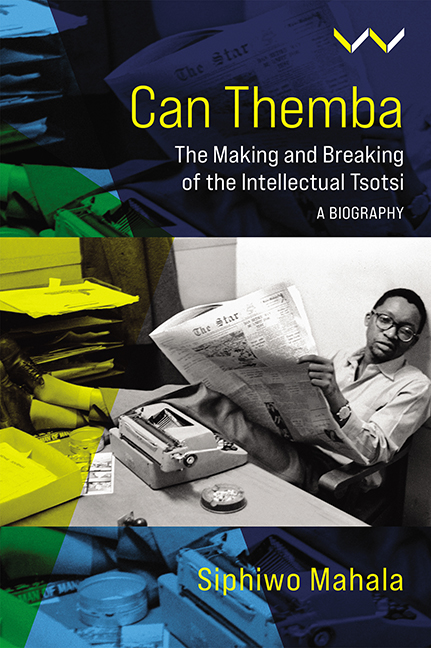Book contents
- Frontmatter
- Dedication
- Epigraph
- Contents
- List of Illustrations
- Acknowledgements
- Introduction
- PART I Death and Birth of a Scribe
- PART II ‘Live Fast and Die Young’
- PART III The ‘Intellectual Tsotsi’
- PART IV Dances with Texts: Writing and Storytelling
- PART V A Writer’s Immortality
- Postscript: The Three Burials of Can Themba
- Notes
- Bibliography
- Index
Introduction
Published online by Cambridge University Press: 26 May 2022
- Frontmatter
- Dedication
- Epigraph
- Contents
- List of Illustrations
- Acknowledgements
- Introduction
- PART I Death and Birth of a Scribe
- PART II ‘Live Fast and Die Young’
- PART III The ‘Intellectual Tsotsi’
- PART IV Dances with Texts: Writing and Storytelling
- PART V A Writer’s Immortality
- Postscript: The Three Burials of Can Themba
- Notes
- Bibliography
- Index
Summary
He [Can Themba] lent to his thoughts the same vivid imagery, sharp staccato rhythm of the township language of the urban tsotsi, because he himself was the supreme intellectual tsotsi of them all.
Lewis Nkosi — Writing Home (2016), 208Lewis Nkosi's words have become so familiar to readers and scholars of Can Themba that we have forgotten how startling they are, given that tsotsis were (and are) feared criminals, while Themba was the quintessential black urban intellectual of his times. But they plunge us into the heart of the myth of who Themba really was, reflecting his status as a writer who straddled fault lines, epitomised paradoxes, and about whom both too much and too little is known (or assumed).
One of these paradoxes is that when Themba died in 1967, at the tender age of 43, he did not have a book to his name – and yet he remains one of the most influential minds in the history of literature and journalism in South Africa. More than half a century later, his name is still part of public discourse and creative flow. This bears testament to the resilience of his voice, which continues to reverberate from beyond the grave.
Themba's short story ‘The Suit’ remains his most famous work and arguably the most successful short story by a South African writer. First published in the inaugural issue of Nat Nakasa's literary journal The Classic in 1963, it remains the pinnacle of his creative output. Aggrey Klaaste rightfully describes ‘The Suit’ as a story that has ‘all the elements of a classic’. Over a period of nearly six decades, it has been translated, republished and adapted numerous times into different genres, ranging from graphics to theatre and film. The overwhelming success of ‘The Suit’ has unfortunately overshadowed many of Themba's other works, some of which have equally great potential.
The critical work published on Themba thus far mostly covers his journalistic and literary productions. Where his biographical background surfaces, it is primarily with regard to the period when he worked for Drum magazine, and very little about his life pre- and post-Drum has been documented. David Rabkin argues that a lot more has been written about Themba than he had himself written.
- Type
- Chapter
- Information
- Can ThembaThe Making and Breaking of the Intellectual Tsotsi, a Biography, pp. 1 - 8Publisher: Wits University PressPrint publication year: 2022



